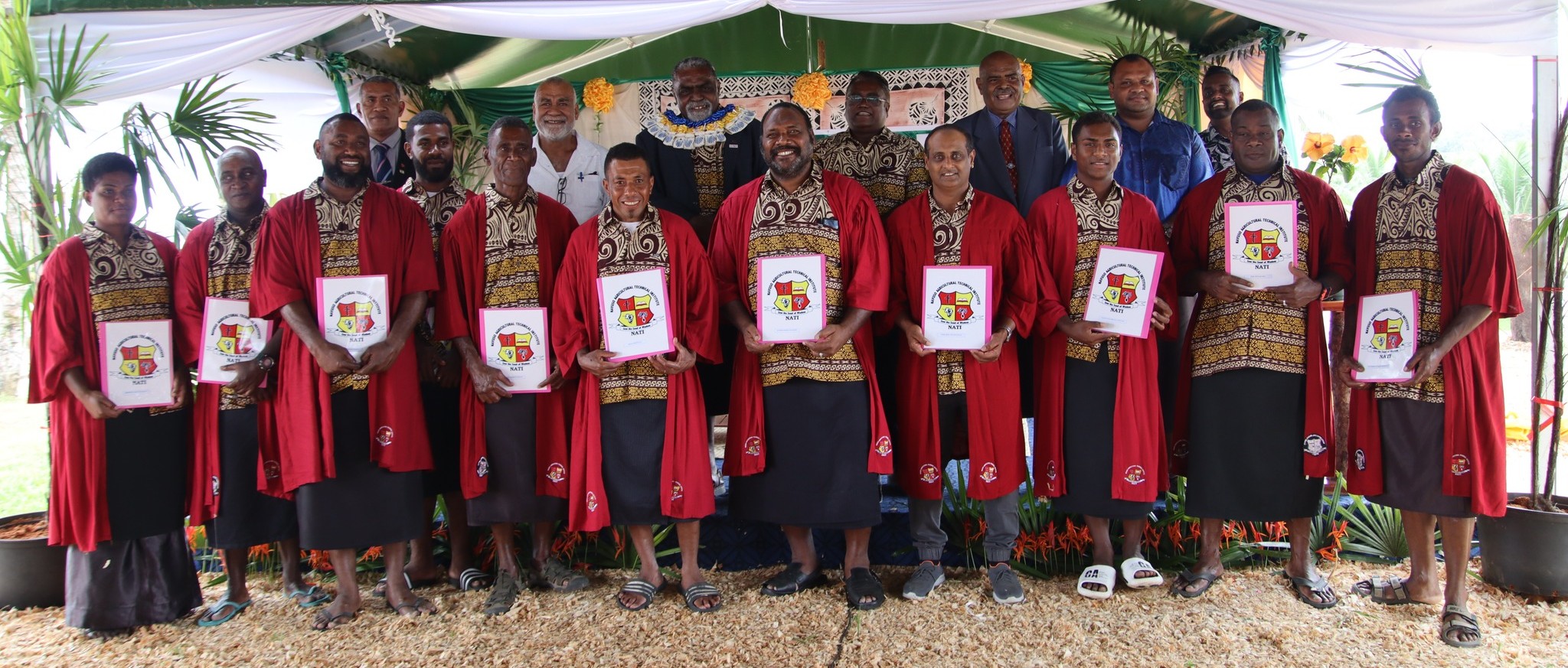TWELVE GRADUATE WITH LEVEL 2 NATIONAL CERTIFICATE IN AGRICULTURE – DAIRY PRODUCTION
October 31, 2025

Twelve individuals, including farmers, a Year 13 student, teachers, and a school principal, graduated today with a Level 2 National Certificate in Agriculture – Dairy Production at the Navuso Agricultural Technical Institute (NATI).
Officiating at the event, the Minister for Agriculture and Waterways, Honourable Tomasi Tunabuna, congratulated the graduates and commended their commitment to strengthening Fiji’s dairy sector.
“The dairy industry has existed in Fiji for over 100 years. Despite many challenges, it has continued to operate through sheer resilience,” said Hon. Tunabuna.
“As our population grows, so does the demand for milk and dairy products. Fiji’s annual milk demand stands at around 70 million litres, yet we currently produce only 7 million litres. Our biggest challenge now is to grow the industry and narrow that gap.”
He emphasized that Fiji cannot continue to import food that can be produced locally.
“This issue can be addressed if we make a determined and concerted effort to work together to equip our young people with the right training to expand food production—especially in dairy.”
Hon. Tunabuna also outlined
key challenges affecting the dairy industry, including:
![]() Lack of modern technology
and best practices;
Lack of modern technology
and best practices;
![]() Outbreaks of Tuberculosis
and Brucellosis;
Outbreaks of Tuberculosis
and Brucellosis;
![]() Climate change;
Climate change;
![]() Expiry of land leases;
Expiry of land leases;
![]() Low milk farm gate prices;
and
Low milk farm gate prices;
and
![]() High cost of production,
especially calf milk replacers.
High cost of production,
especially calf milk replacers.
Despite these hurdles, Hon. Tunabuna noted that the industry remains full of opportunities for improvement and expansion.
“I am thankful that the industry has managed to recover from the outbreak of Tuberculosis and Brucellosis. While their impacts are still being felt, especially through reduced cattle numbers, we must continue rebuilding.”
Hon. Tunabuna reaffirmed the Coalition Government’s commitment to supporting the dairy industry both physically and financially.
“The Government’s annual grant to the Fiji Cooperative Dairy Company Limited (FCDCL) has increased significantly—from $300,000 to $5.5 million today,” he said.
“In addition, Government allocated $2.3 million to NATI through the Ministry of Agriculture and Waterways, with a further $16,000 provided specifically for this Dairy Training.”
He encouraged farmers to reinvest in their farms and adopt improved pasture management, fencing, nutrition, and breeding techniques.
“The dairy industry is much more than just cows and milk. It requires in-depth knowledge of animal husbandry, nutrition, farm management, and disease control to successfully run a dairy farm.”
Senior Lecturer at NATI, Ms. Unaisi Waibuta, explained that the training covered three major modules over 620 learning hours.
Topics included cow anatomy and milk production, animal husbandry, dairy cow management, nutrition, disease control, milking hygiene, pasture and fencing, occupational health and safety, record keeping, and dairy legislation.
“Students also undertook extensive practical sessions such as cow restraining, hoof trimming, castration, and milking standard operating procedures,” Ms. Waibuta said.
Among the graduates was Year 13 student Navitalai Drugu Naitaka from Tailevu North College, who managed to balance his schoolwork with the rigorous training.
“I was sponsored by my Mataqali Narocake of Dakuinuku Village, Sawakasa, in Tailevu. With the large number of dairy cattle we have, I was honoured to be entrusted with this responsibility,” he said.
“I want to pursue veterinary studies and, in turn, assist my village by improving animal health and dairy productivity.”
Also among the graduates was St. John College Principal, Mr. Alosio Momo Saukuru, who said he was grateful for the opportunity and that the experience serves as a valuable lesson for his school back in Ovalau in the Lomaiviti Province.
Hon. Tunabuna congratulated the graduating class and encouraged them to take what they had learned back to their farms and communities to improve milk production and strengthen local livelihoods.
ENDS
